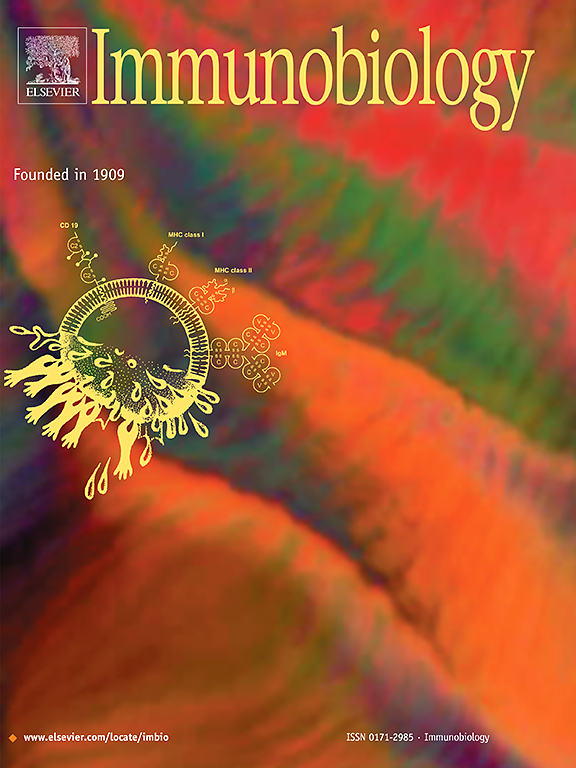Prior appendectomy attenuates the immune protective efficacy of BCG vaccination against Mycobacterium tuberculosis infection
IF 2.3
4区 医学
Q3 IMMUNOLOGY
引用次数: 0
Abstract
Cecal appendix is a unique niche for commensal bacteria, and has been considered the primary site for immunoglobulin A production. Yet its immune function in anti-infection immunity has not been fully understood. In order to elucidate whether cecal patch (CeP), the murine version of appendix, would influence the immune response induced by Mycobacterium tuberculosis (M. tb) and the vaccine effect of Bacillus Calmette-Guérin (BCG), BALB/c mice at 4 weeks of age received appendectomy or sham operation and recovered for 2 weeks before intranasal infection with 2 × 107 CFU Mycobacterium tuberculosis H37Ra. Appendectomy of mice led to a reduction in lung macrophage numbers 7 days post infection (p. i.), and aggravated lung immunohistopathology 4 weeks p. i.. Appendectomized mice vaccinated with 5 × 106 CFU BCG exhibited attenuated BCG-specific serum IgG, reduced lung/splenic IFN-γ+ T response, and weakened T proliferation and cytotoxicity, and eventually worsened lung pathology compared to sham operated mice. Mechanistically, we found that appendectomized mice at a young age (4 weeks) had an attenuated maturation of mesenteric lymph node (MLN) conventional dendritic cells (cDCs), which accounted for the impaired systemic IFN-γ+ T response and cytotoxicity against M. tb. Our data suggest that intact appendix maintain intestinal DC maturation and systemic Th1 induction against M. tb and has an assistant role in increasing immune efficiency of BCG vaccine.
先前阑尾切除术降低了卡介苗接种对结核分枝杆菌感染的免疫保护作用
盲肠阑尾是共生细菌的独特生态位,被认为是免疫球蛋白a产生的主要部位。但其在抗感染免疫中的免疫功能尚不完全清楚。为了阐明盲肠贴片(cecal patch, CeP)是否会影响结核分枝杆菌(M. tb)诱导的免疫应答和卡介苗(Bacillus calmette - gusamrin, BCG)疫苗的效果,BALB/c小鼠在4周龄时接受阑尾切除或假手术,并在鼻内感染2 × 107 CFU结核分枝杆菌H37Ra前恢复2周。小鼠阑尾切除术导致感染后7天肺巨噬细胞数量减少(p. i.), 4周肺免疫组织病理学加重。与假手术小鼠相比,接种5 × 106 CFU卡介苗的阑尾切除小鼠表现出BCG特异性血清IgG减弱,肺/脾IFN-γ+ T反应降低,T增殖和细胞毒性减弱,最终肺部病理恶化。在机制上,我们发现年幼(4周)阑尾切除小鼠的肠系膜淋巴结(MLN)常规树突状细胞(cDCs)成熟减弱,这是导致系统性IFN-γ+ T反应和抗结核分枝杆菌细胞毒性受损的原因。我们的数据表明,完整的阑尾维持了肠道DC成熟和对M. tb的全身Th1诱导,并在提高卡介苗免疫效率方面具有辅助作用。
本文章由计算机程序翻译,如有差异,请以英文原文为准。
求助全文
约1分钟内获得全文
求助全文
来源期刊

Immunobiology
医学-免疫学
CiteScore
5.00
自引率
3.60%
发文量
108
审稿时长
55 days
期刊介绍:
Immunobiology is a peer-reviewed journal that publishes highly innovative research approaches for a wide range of immunological subjects, including
• Innate Immunity,
• Adaptive Immunity,
• Complement Biology,
• Macrophage and Dendritic Cell Biology,
• Parasite Immunology,
• Tumour Immunology,
• Clinical Immunology,
• Immunogenetics,
• Immunotherapy and
• Immunopathology of infectious, allergic and autoimmune disease.
 求助内容:
求助内容: 应助结果提醒方式:
应助结果提醒方式:


